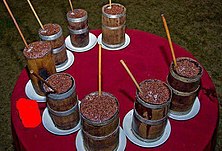|
Tongba
Tongba (Nepali: तोङबा pronounced [toŋba]) is a millet-based alcoholic beverage found in the eastern mountainous region of Nepal and neighbouring Indian regions of Sikkim and Darjeeling.[1][2] It is a sign of respect to a guest, and the drink is also an important element of special occasions and festivals. It is the traditional and indigenous drink of the Limbu people.[2][3] Preparation Tongba is actually the name of the vessel that holds the fermented millet beverage known as mandokpenaa thee.[4] Tongba is prepared from brown finger millet (Eleusine coracana, also known as ragi in India or kodo in Nepal) grown in hilly regions, and it is cooked and combined with traditionally cultured khesung, which is a microbial colony or starter culture. 'Khesung' is the Limbu version of the Nepali term 'murcha'; the Lepchas call it 'thamik', and Bhutias refer to it as 'phab'. Ethno-medicinal propertiesTongba is a fermented millet beer from the Himalayas that contains biologically active components that may have therapeutic properties against high-altitude illnesses.[5] Tongba is made by steeping fermented millet for a few minutes, then sucking the resulting cloudy liquid through a bamboo straw with a seed-filtering bottom. It is slightly alcoholic, smooth, and has a mild, milky, mushroomy taste with some bready hints.[6][7] Tongba is a staple for travelers who carry their meals on their backs. It is also good for people who live in colder regions because it helps with digestion and boosts immunity[citation needed]. Tongba contains glycoside, amino acids, fatty acids, terpenoids, and phenol, which have antioxidant and antibacterial potential[8] and therapeutic properties against high-altitude illnesses including body moisture retention property in high-altitude cold and dry weather. Studies have also shown that tongba is metabolomically similar to Japanese sake.[5] See alsoReferences
|
||||||||||||||||||||
